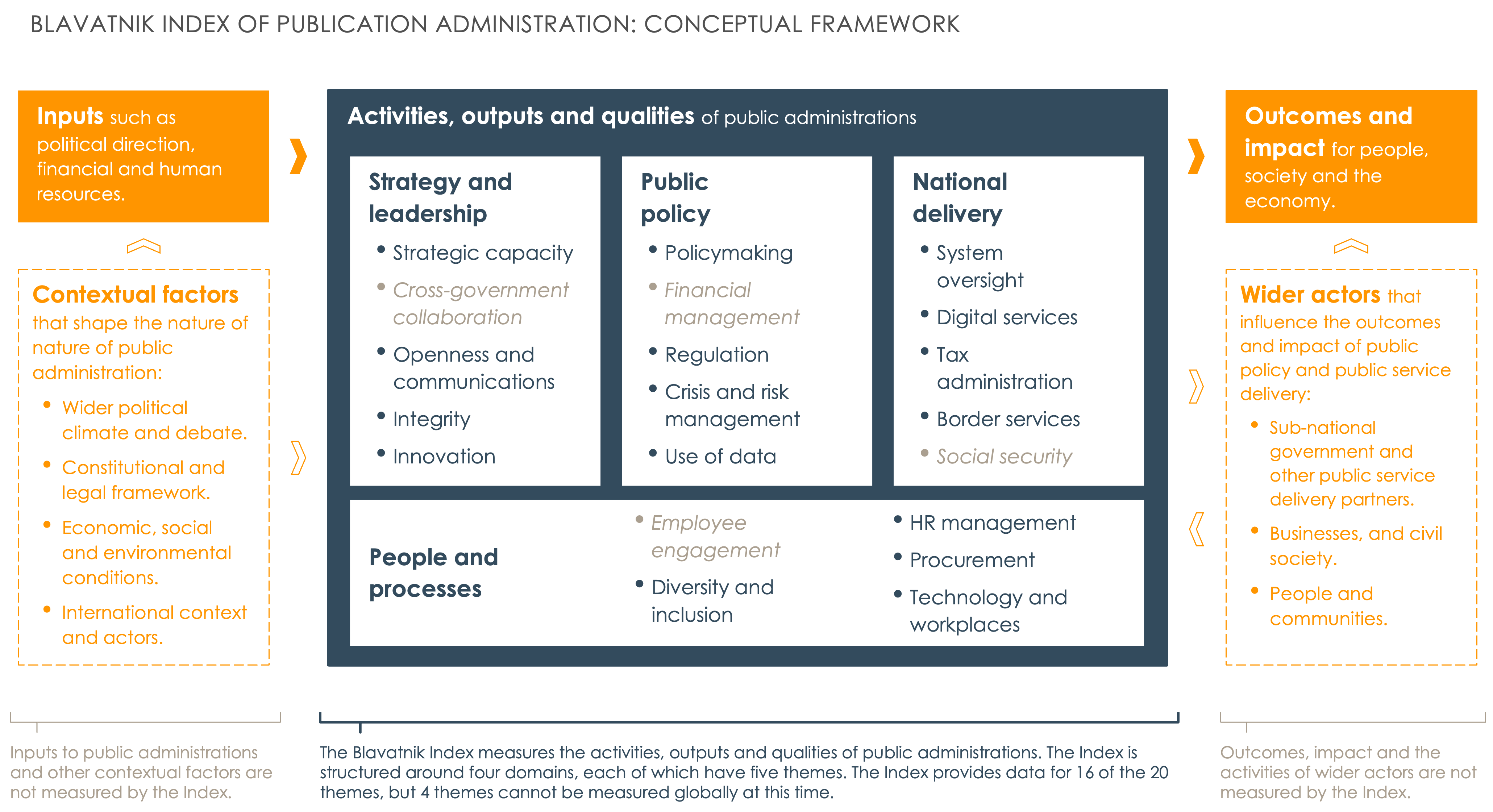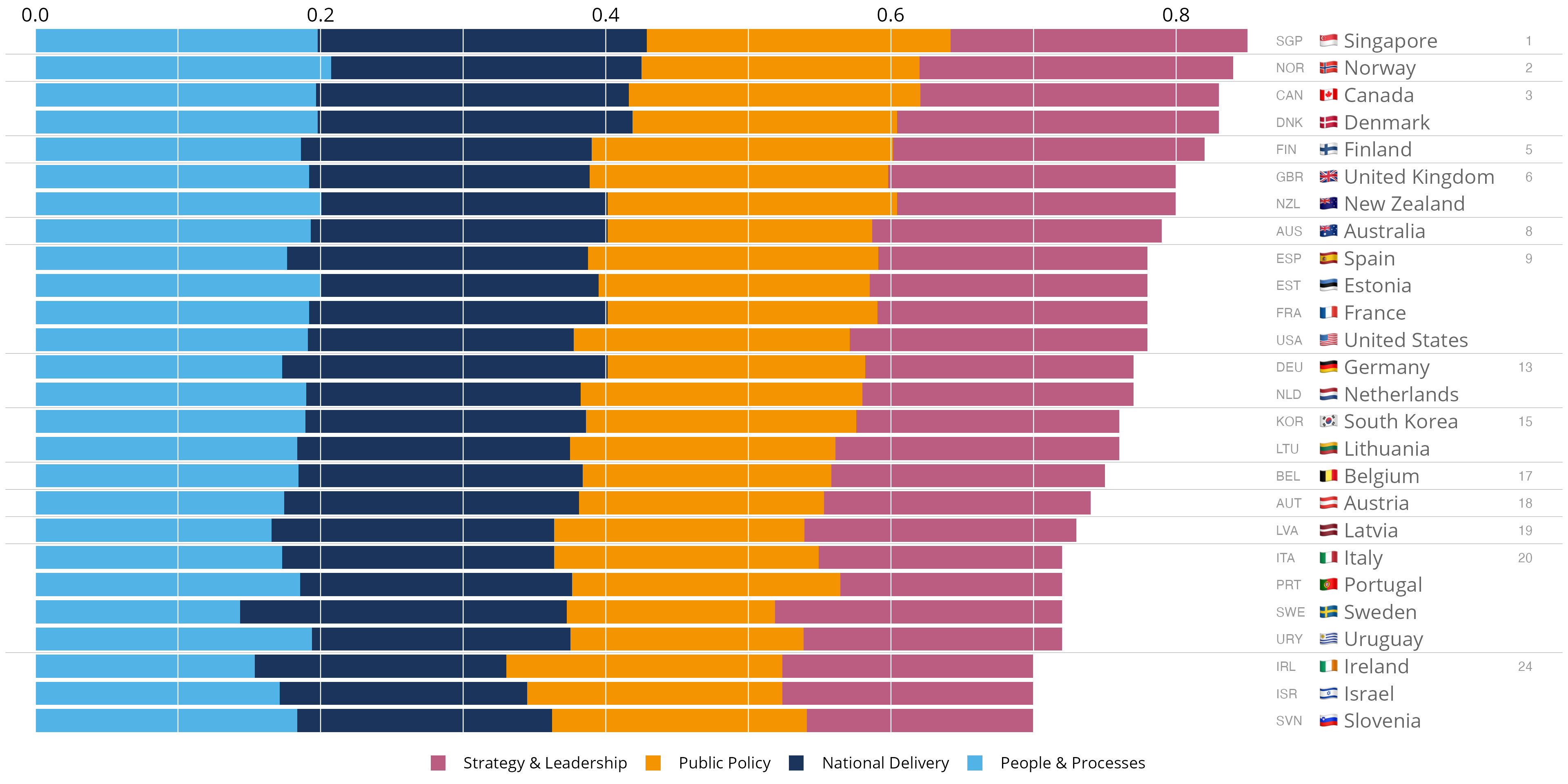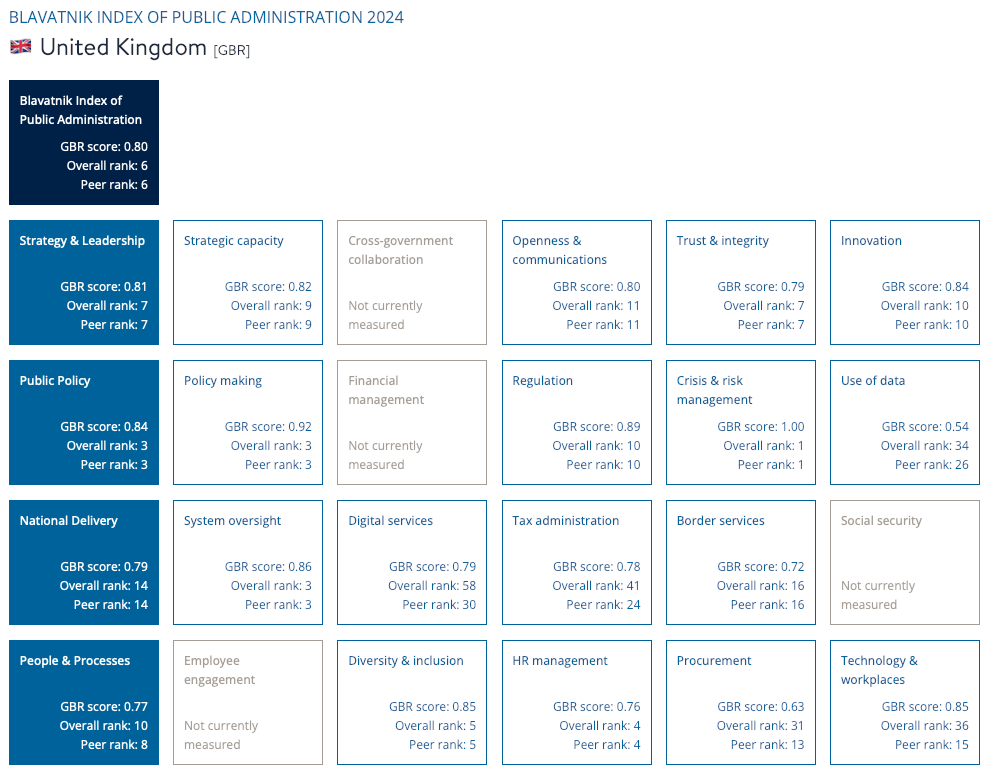Gus O’Donnell and Kathy Hall review what the latest Blavatnik Index has to show us about comparative strengths and weaknesses
Sir Chris Wormald, the new Cabinet Secretary, told Parliament earlier this year that great policymakers are “self-confident enough to pick up the phone for that world expert opinion, and humble enough to listen to the answer”.
His comment could not have been more timely. Last December the Blavatnik School of Government launched the new Blavatnik Index for Public Administration, which for the first time measures the relative performance of 120 national civil services on strategy, policy, delivery and people & processes. Aspiring policymakers in the UK have a place to start as they look to other countries for inspiration and help with public sector problem solving.
When we presented the results of the Index to domestic and international colleagues at the Global Government Leaders Forum and Global Government Summit in Singapore in January, we were particularly struck by the enthusiasm of Singaporean civil servants — from junior to senior and across multiple departments. Singapore came out top in our overall rankings — and might have been excused for reacting with a degree of satisfaction and complacency — but their civil servants were conspicuously eager to know where they had done particularly well, or less well, and what they could learn from other nations that had also scored highly. When she gave evidence to the Public Administration and Constitutional Affairs Committee in December last year, Catherine (Cat) Little, the Chief Operating Officer for the Civil Service and Permanent Secretary of the Cabinet Office, highlighted the Singapore Government as a “standout for some major transformations it has achieved.”
In this article we’ll look at the background to the Index, describe the high-level results, and look in more detail at why the UK has done well in some areas, but has some catching up to do in others.
Developing the Index – building on the past, refreshing for the future
The Blavatnik Index builds on the previous International Civil Service Effectiveness Index (InCiSE), a collaboration between the UK Cabinet Office, Institute for Government, Open Society Foundations and the Blavatnik School of Government, initiated and championed by then Cabinet Secretary Jeremy Heywood, and published in 2017 and 2019. Then, as now, the primary goals of the Index are to provide national civil services – and the ministers, taxpayers and citizens they work for – with a picture of their relative performance; to encourage civil servants to learn from best practice and to share lessons; and to highlight the importance of collecting and openly publishing good quality global data on effective public administration.

Figure 1: The conceptual framework of the Blavatnik Index of Public Administration Source: Blavatnik School of Government, University of Oxford
Developed from academic literature, desk research and input from practitioners, the Index looks at performance across four key domains, each with five themes, which are broadly common across national public administrations:
- Strategy and Leadership: covering strategic direction; core public service values and behaviours such as integrity and openness; and innovation.
- Public Policy: core public administration functions and activities including policymaking, regulation and use of data and analysis.
- National Delivery: direct public service delivery commonly carried out at the national level such as borders or tax administration – and ‘system oversight’ of the wider range of public services delivered by others.
- People and Processes: what it is like to work in, or for, the public administration – for example, HR management or use of technology.
So far we have identified data, on a global basis, that provides measures for 16 of the 20 themes. In the framework, we strongly recognise that public administrations operate in vastly different contexts with variable inputs in terms of resources, and that many different actors have roles to play in the outcomes achieved by society.
While the Index’s primary goal is to facilitate peer learning, the ‘headline’ rankings will always attract attention.
The top 2024 performers are: Singapore (1st), Norway (2nd), Canada and Denmark (joint 3rd) and Finland (5th). The United Kingdom comes joint 6th with New Zealand. At least one country from each continent except Africa is represented in the top 25. While Western Europe may dominate the top places, Eastern European public administrations also perform well with the Baltic states (Estonia, Lithuania and Latvia) and Slovenia all featuring in the top 25. The four countries that share 9th place overall all have a different top domain – People & Processes in the case of Estonia, National Delivery in France, Public Policy and National Delivery in Spain, and Strategy and Leadership in the United States.
The UK picture
So, what does this mean for the UK Civil Service? The good news is that with its 6th place finish the UK has a top ten ranking for many of the Blavatnik Index’s underlying themes, despite some of the public challenges of recent years. The very high-level story, one that will be familiar to most civil servants, is that the UK performs best on Public Policy (3rd) and least well on Delivery (14th), with Strategy & Leadership (7th) and People & Processes (10th) falling in between.
The UK has much good practice to share with its peers in other countries, for example on:
- Cybersecurity, where (based on 2020 data from the Global Cybersecurity Index) the UK scored top marks on planning for future incidents; aligning cybersecurity strategy across government, building cybersecurity capacity; and responding to cross-border threats. Deployment of response teams for incidents and emergencies was the only area in which the UK did not score maximum marks (although in the 2025 Index, the UK now does have full marks there too).

Figure 2 – The Top 25 countries in the Blavatnik Index of Public Administration
Note: The size of the coloured bars for each country shows the relative strength of the four domains that make up the Blavatnik Index score. Source: Blavatnik School of Government, University of Oxford

Figure 3 – The UK’s overall Index, domain and theme scores in the Blavatnik Index of Public Administration 2024
Note: Each box shows the UK’s score, overall rank out of 120 countries and rank amongst the 39 high income economies included in the Blavatnik Index. The overall Index results are shown in the dark blue box, the domain results in the medium blue boxes, and the theme results in the white boxes. Source: Blavatnik School of Government, University of Oxford
- Policy making, where (based on 2022 data from the Sustainable Governance Indicators) the UK’s systems for collective Cabinet responsibility, Cabinet Committees and the flexibility and adaptability of its informal policymaking approach can be seen as strengths in resolving policy tensions and reaching agreed positions. Interestingly, the 2024 Sustainable Governance Indicator results released after the Index was published, has revised its own framework and questionnaire and is less positive about the UK’s policy making systems, particularly when it comes to coordinating across government and between different levels of government. These findings will be an interesting study for civil service leaders with responsibility for the five missions (see below).
- HR management/Diversity & Inclusion, where the UK continues to have strong merit-based recruitment practices (based on data from several sources), which date as far back as the Northcote-Trevelyan reforms of the 1850s. The UK (based on International Labour Organisation data) also has relatively high levels of representation of women both across the Civil Service as a whole and at senior levels.
Areas where the UK appears to perform relatively less well include ‘use of data’ and ‘digital services’. On the use of data, the UK performs similarly to top-ranked Norway on statistical planning and performance but less well on our data coverage and openness and much less well on re-use of data in national policy documents. On digital services, the UK ranks relatively highly on both digital strategy and end-user services but falls considerably behind other countries such as France and South Korea when it comes to the back-end technologies that support exchanging data and managing services across different departments. Ministers and Cat Little have already highlighted digital and data as top priorities for improvement.
Mission-critical
Top priority for ministers and civil service leaders over the coming Parliament is the ability of the Civil Service to support the Government’s ambition for a mission-led approach. The Prime Minister has described mission-led government as one that can “prioritise long-term change, drive innovation across the public sector and work in partnership with all the country – businesses, civil society and the British people, all galvanised towards the same goals.” The Blavatnik Index incorporates several of these dimensions, providing a guide as to how the UK Civil Service may be able to adapt to mission-led government and where it may look for lessons. Chris Wormald, Cat Little and other civil service leaders will take comfort from the UK’s top-ten finish in most aspects but also note that there are plenty of lessons to learn from other countries.
Strategic capacity
Developing and sustaining strategy capacity in the Civil Service is important for prioritising longer-term change. Here the UK just makes the top ten but could look to first placed Finland for further lessons. Finland scores particularly well compared to the UK on the influence of its central strategy department, located in the relatively powerful Prime Minister’s Office. This may suggest that building greater expert and influential strategic capacity – centrally and across the Civil Service more widely –
could help with the success of mission-driven government. The UK Civil Service may also want to look at its own top-ranked arrangements for cybersecurity and crisis response to learn lessons for developing its strategic capacity. This topic of how government can be better at long-term strategy is being examined in depth by Lucy Smith, this year’s Heywood Fellow at the Blavatnik School of Government.
Innovation
Governments around the world have been focusing on ‘innovation’ in their reform programmes for many years – but measuring public sector innovation is not easy and there is limited data for international comparison.
However, based on data about the support for digital innovations in the public sector and the use of new technologies in tax agencies, the UK ranks 10th overall in the innovation theme of the Blavatnik Index.
The UK already has strategies to support the adoption of digital technologies and is working with startups to deliver new digital services: for example, HMRC uses eight of the ten technologies and practices measured in the International Survey of Revenue Administration, including automation technologies, AI and machine learning, and behavioural insights. The UK does differ from many of its peers in not having a whole- of-government digital ID. In addition, compared to other countries, there has been less clarity over the institutional responsibilities in government for promoting innovation.
Partnership
The UK does relatively well on ‘system oversight’ – or the confidence that its priorities (such as missions) will be implemented – due to its relatively centralised system and strong executive powers (especially when one party has a parliamentary majority). But there may be lessons to learn from Germany and Sweden which are ranked more highly despite less centralised systems – perhaps, we might hypothesise, due to greater codification of responsibilities at different levels of government. This suggests that missions may have a greater chance of success where there are strong, centralised UK levers and/or clarity of responsibilities. We have seen already examples where the government has looked to amend or make more clear relative powers and remits to support mission-delivery, whether on national/local remits on planning or the relationship between the Department of Health & Social Care and NHS England.
However, as the vast literature and our own experience on public service delivery and transformation demonstrates, significant and lasting change cannot be achieved top down but requires real partnership and engagement, On ‘engagement and feedback’ with businesses and civil society, the UK ranks 8th and could potentially look to the likes of Canada and Estonia for lessons. At the recent Global Government Forum 2025, the outgoing Estonian Cabinet Secretary described how ongoing engagement and feedback, which in turn builds trust, has been vital for his country’s successful digital transformation of public administration.
Whilst examples of genuinely participative policy-making and deliberative engagement remain relatively rare at national level across the missions, we have seen some examples such as the NHS 10-year plan public and workforce engagement exercise. The challenge in converting that into trust-building will be whether the public can see their priorities reflected in the missions – and that improvements are being made. The Government Outcomes Lab at the Blavatnik School of Government is a partnership set up with the UK Government to explore the most effective and innovative arrangements for partnership working on public services.
Improving for the future
When launching InCiSE in 2017, Jeremy Heywood hailed the idea of a common framework and index that could track relative civil service performance over time as a major breakthrough – but one that requires civil services, academics, relevant think-tanks and international organisations to develop and improve it over time. Whilst the Blavatnik Index incorporates some of the feedback from previous InCiSE editions, there is more work to be done.
In the meantime, civil service colleagues both in the UK and globally should continue to use the Index to learn and share good practice; As Leo Yip, Head of the Singaporean Public Service said at the launch of the Blavatnik Index – “even though we operate in different countries with different systems of governance, civil servants are all in the same profession and have the common aim of solving largely similar challenges and improving the lives of our peoples. It is therefore all the more important that we learn from one another.”
About the Blavatnik Index
Five years on from the second edition of InCiSE, the refreshed Blavatnik Index brings together the best openly available, published global data to measure the relative performance of 120 national public administrations (up from 38 OECD countries in InCiSE), drawing on the valuable work of multilateral organisations, academia and civil society research programmes.
The Index, however, can only ever provide a partial picture to complement national and theme-specific international data. That picture is determined by the coverage and quality of the data available – and by choosing to expand our coverage to 120 countries and only include datasets that are openly published, we have had to make some sacrifices, for example in not being able to use richer regional datasets. Some of the data sources we have used are surveys or self-reported, which carry all the usual health warnings. Some themes have multiple metrics, others only a few – and we cannot measure some at all. All of this means the Index can throw up some anomalies in individual results and rankings, or not provide as full a picture as we would like.
The interactive ‘data explorer’ and ‘country snapshot’ tools on the website https://index.bsg.ox.ac.uk allow civil servants to explore the best performing countries on every theme and indicator; explore the performance of any particular country; and pick and choose a group of countries to compare. The website also provides information on the methodology, data sources and code so civil service analysts can explore for themselves – and even create their own versions of the index.
Gus (Lord) O’Donnell is a former Cabinet Secretary and Chair of Oxford University’s Blavatnik Index of Public Administration Senior Leadership Panel.
Kathy Hall is Chief Operating Officer at the Blavatnik School of Government (currently on parental leave) and a former senior civil servant.





